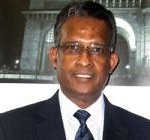The India-Sri Lanka relationship has been the focus of media attention due to domestic politics in Tamil Nadu and the U.S.-sponsored resolution at the United Nations Human Rights Council (UNHRC) calling for reconciliation and accountability for crimes against the Tamil minority in the 2009 war in Sri Lanka. The High Commissioner of Sri Lanka to India, Prasad Kariyawasam, shares his views with Gateway House’s Anirudh Menon and Hari Seshasayee on the India-Sri Lanka bilateral relationship and the political tension in the run-up to the resolution.
Q: We have long had successful trade and economic relations with Sri Lanka, but recent reports indicate that there is apprehension about signing the Comprehensive Economic Partnership Agreement (CEPA). Why, and when will this change?
As you recall, Sri Lanka and India signed a Free Trade Agreement (FTA) back in 2000. Now we are at the next stage. Both countries must sign the agreements when their respective economies and stakeholders are ready to take on the next level of responsibilities. At this point, there are still some issues in terms of the Comprehensive Economic Partnership Agreement (CEPA). It will therefore take some more time and negotiations. We have to be mindful that India is a very big economy and Sri Lanka is a small economy but well-placed to complement the Indian economy as a gateway and as a hub. And we have to create a package that will be comfortable for both sides, but forward-looking too.
In the meantime business relations are booming between the countries. India is Sri Lanka’s largest investor and in fact, out of 46 international CEOs in Sri Lanka, 43 are Indian. So the ground is moving well already.
Q: How does Colombo view the protests by the youth in Tamil Nadu and the political tension that followed?
Sri Lankans are naturally very disturbed, because most of these agitations are based on hearsay, misreporting, and lobbying by motivated parties – especially those who are wedded to LTTE ideology and were stung by the defeat of the LTTE. They came up with fantastic theories about the ground situation in Sri Lanka, which is not the reality. Even their projection on how the war was conducted is exaggerated. The number of casualties, according to some human rights NGOs is 40,000 while our census shows that 7,900 died, including both civilians and LTTE combatants. All this has created an unfortunate situation in Tamil Nadu which is inimical for good relations between Tamil Nadu and Sri Lanka and the India-Sri Lanka bilateral as well.
Sri Lankans are naturally concerned, especially of the violent acts against innocent Sri Lankan nationals in Tamil Nadu – the attack on the two monks, and both the Bank of Ceylon and the Sri Lankan Airlines offices were vandalised. These are unpardonable acts. We consider the attacks against civilians as acts of terrorism.
We urge the Tamil Nadu public and leaders to study and understand current ground realities and we invite them to visit Sri Lanka to see the situation for themselves.
Q: What is the government’s position on the United Nations Human Rights Council (UNHRC) resolution up for vote today? Why is it sponsored by the U.S.? How much progress has been made on the implementation of the LLRC’s recommendations?
We think that that the UNHRC resolution is uncalled for. There is no reason to have a resolution at this juncture when we are on the right path on the ground. Internationalizing Sri Lanka’s situation is counter-productive to the path of reconciliation and consolidation of peace on the ground.
The U.S. has its own reasons for sponsoring the resolution. I can only say that it is creating tensions in our region, tension in Tamil Nadu, tension between India and Sri Lanka. The U.S. must think through why they would focus on Sri Lanka when other situations around the world are crying for attention.
Q: How much progress would you say has been made on the implementation of the recommendations of the Lessons Learnt Reconciliation Committee (LLRC) report? Has India extended its support?
The LLRC report has a series of recommendations. We are implementing them at our own pace and we will pluck the low-hanging fruits first and then move forward. We have a programme of action which we are implementing step-by-step.
Meanwhile, President Rajapaksa has taken the initiative to make Sri Lanka a tri-lingual nation in ten years’ time. He invited India to join this initiative and asked former Indian President A.P.J. Abdul Kalam to join him in Colombo and unveil this programme. We are about to sign an MoU with India to help with the technical aspects of this programme. But there are other countries helping as well. The idea behind this initiative is very important since it will support our model of sharing power with all communities. In this effort, we need to develop tools of communication between the communities.
Unlike India, Sri Lanka is not a federal State. Our model of devolution of powers to the provinces is different from India. Ours is not on the basis of ethnicity or language but on the basis of geography. We have only three languages so the idea is to make every citizen familiar with Sinhalese, Tamil and English. Though Tamil is already an official language, more measures are needed to enable people to exercise that right more effectively.
Prasad Kariyawasam is the Sri Lankan High Commissioner to India, with concurrent accreditation to Bhutan and Afghanistan. Prior to this, he has had diplomatic assignments in Geneva, Riyadh, Washington, New Delhi and New York.
This interview was exclusively conducted for Gateway House: Indian Council on Global Relations. You can read more exclusive content here.
For interview requests with the author, or for permission to republish, please contact outreach@gatewayhouse.in.
© Copyright 2013 Gateway House: Indian Council on Global Relations. All rights reserved. Any unauthorized copying or reproduction is strictly prohibited.


